City guides


Nashville Travel Guide
Tennessee's state capital Nashville draws millions of country fans every year, serenaded by the Nashville sound of crooning vocals, smooth strings and more pop-leaning sensibilities. Hundreds of famous musicians have made their name in Nashville since 1925 when the legendary Grand Ole Opry went on the air, broadcasting weekly shows touting the talents of up and coming stars. This all began in the downtown Ryman Auditorium where the likes of Dolly Parton and Roy Acuff first strutted their stuff.
Visitors still come today to visit Opryland, the resort that incorporates the new Grand Ole Opry, northeast of the city. Just around the corner is the Country Music Hall of Fame and Museum while fans flock to the area known as The District, crammed with nightclubs, bars and restaurants where country music reigns supreme.
Beyond the soundwaves, Nashville offers many historic sites such as the old Belle Meade Plantation, a centre of thoroughbred breeding and training, as well as the Tennessee State Museum, filled with exhibits detailing the entire state and area history from millions of years ago to the present day.
Known as the Athens of the South because of its early focus on education, there's also the added attraction of the Parthenon, a full-scale replica of the original that houses a fine collection of art. For those who want to experience a bit of Tennessee's beautiful country scenery and rich wildlife, the Great Smoky Mountains National Park is around four hours away.
Things to do in Nashville
Nashville is well known as the country music capital of the world, so it's no surprise that many of its most popular attractions are music-related. The Country Music Hall of Fame and Museum is a great place to learn about the history of the beloved genre, while the Grand Ole Opry and Ryman Auditorium offer the opportunity to catch popular acts in equally-famous settings. The General Jackson Showboat also offers dinner entertainment on a historic 300-foot (91m) paddleboat.
But there's more to offer tourists in Nashville than just country music. Visitors can learn about the city's long and proud history at the Tennessee State Museum and the Belle Meade Plantation. The city also has plenty of pretty outdoor spaces including Radnor, Centennial Park and Nashville's famous Parthenon. There are numerous golf courses for those wanting to hit the greens while children will enjoy the Nashville Zoo at Grassmere and the Adventure Science Center.
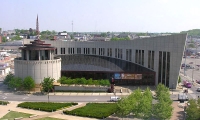
Country Music Hall of Fame and Museum
Found in Downtown Nashville, the Country Music Hall of Fame is one of the world's largest museums and research centres for American music. The core exhibit is Sing Me Back Home, a journey through the history of country music, drawing on the museum's rich collection of costumes, memorabilia, instruments, photographs and manuscripts. Temporary displays focus on individual Hall of Fame inductees, and the Archive Spotlight Series highlights specific themes from the main exhibition. There's a big assemblage of moving images, recorded sounds and photographs, as well as media on the development of recordings, filming and photography. Among the exhibits are Elvis Presley's gold-leaf covered Cadillac, Emmy Lou Harris' jewelled cowboy boots and Bob Dylan's autographed lyric sheets.
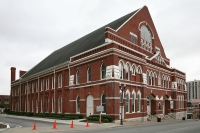
Ryman Auditorium
Built in 1892, the Ryman Auditorium is regarded as the founding home of country music, having hosted the world-renowned Grand Ole Opry radio show until 1974. Originally serving as an evangelical meeting hall, regular performances by gospel singers and choirs became more common with passing years, with music eventually becoming the building's main focus. Nicknamed the Mother Church of Country Music, superstars like Sarah Bernhardt, Patsy Cline and Elvis Presly have all taken to its stage. Now restored, it holds regular concerts while also operating as a museum, detailing its rich history and offering exhibits highlighting all the great names to have walked through its doors.
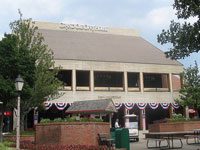
Grand Ole Opry
No visit to Nashville is complete without attending a show at the Grand Ole Opry, which has been going strong on the airwaves since 1925. From a vast 4,400 seat auditorium on Opryland Drive, the world's longest running radio show is still broadcast on the Nashville station WSM (650 on the AM dial), featuring new stars and legends of country and bluegrass music performing live on stage. From February to October, the shows are hosted by the new Grand Ole Opry House while the winter run from November to January is hosted by the Opry's former smaller home, the Ryman Auditorium.
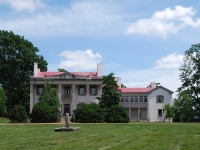
Belle Meade Plantation
Belle Meade Plantation is home to an 1853 Greek Revival mansion carefully restored to show off its original elegance. The plantation was founded in 1807 by John Harding, who brought thoroughbred horses for racing and breeding to Tennessee from the commonwealth of Virginia. Visitors to the plantation today can view the authentic Civil War bullet holes that riddle the old mansion's pillars. Among the outbuildings that survive on the 30 acre (12 ha) site is one of the oldest houses in Tennessee, a log cabin built in 1790. There is also a carriage house, visitor centre, tearoom and gift shop. Tours of the antebellum furnished mansion and grounds are given by guides dressed in period costume.
Parthenon
The centrepiece of Nashville's Centennial Park is the world's only full-scale replica of the Parthenon in Athens, complete with a re-creation of the 42ft (13m) high statue of Athena that stood outside the temple in ancient Greece. Like the original, the Parthenon in Nashville faces east to let in light as the sun rises. The Parthenon was originally built for Tennessee's 1897 Centennial Exposition, with direct plaster casts of the Parthenon Marbles and sculptures which adorned the pediment of the temple from 438 BC. The massive bronze doors measuring 24 feet high and seven feet across come in two sets of two, making them the largest set of matching doors in the world. Today, the Parthenon in Nashville serves as the city's art museum, with a collection highlighting 19th and 20th century American artists.
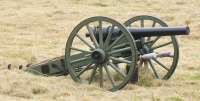
Tennessee State Museum
One of the largest of its kind in the United States, the Tennessee State Museum tells the story of the region from prehistoric times to the modern day. Founded originally as a portrait gallery, the collection has grown to encompass anything from natural history, first peoples and the throes of independence to civil war, world wars and the Cold War era. Alongside these are numerous temporary exhibits, covering things such as the women's vote and Tennessee's musical heritage, as well as permanent displays of well-preserved artefacts . Also featured are recreations of a 19th-century gristmill, an 18th-century print shop and a Victorian painting gallery.
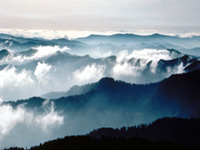
Great Smoky Mountains National Park
East of Nashville on the border between Tennessee and North Carolina lies the Great Smoky Mountains National Park. Covering more than one and a half million acres, the park is the largest in the eastern United States and most visited in the country. A designated International Biosphere Reserve and a World Heritage Site, it draws millions of visitors every year with its panoramic views, tumbling mountain streams and uninterrupted forest. The mountains are home to a variety of plant and animal life, many of which are unique to the area. A symbol of the Smokies, the American Black Bear is probably the most famous resident, while rarer inhabitants include the river otter, elk and Peregrine Falcon. The park offers numerous outdoor activities and glimpses into early Appalachian farm life, with 77 historic structures such as barns, churches and gristmills.
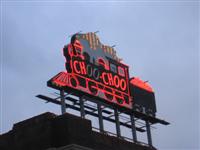
Chattanooga
The fourth largest city in Tennessee, Chattanooga lies at the junction of four interstate highways and well worth a visit. The city has had a renaissance in recent years, redeveloping its riverfront and downtown area to offer an extensive greenway system and river walk through the historic art district and several beautiful parks. Main attractions in the city are the Tennessee Aquarium, Civil War battlefields, the Bessie Smith Cultural Center and a Creative Discovery Museum, as well as the renowned Jack Daniels distillery. The Chattanooga Choo Choo Hotel, named after the song, provides the opportunity to sleep in historically decorated train cars and to look at models of trains and trolleys used in the city over the years. The main destination for visitors to Chattanooga is Lookout Mountain, with its historic Incline Railway, the steepest passenger railway in the US, offering panoramic city views, as well as views of the Great Smoky Mountains 100 miles (161km) away. Lookout Mountain is also home to Battles for Chattanooga Museum, the underground Ruby Falls and Rock City Gardens, from where it's possible to view seven states on a clear day. There are zipline tours available from Ruby Falls, an adventurous way to take in both the falls and the beautiful mountains.
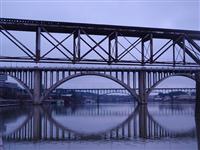
Knoxville
Visitors are treated to plenty of attractions in Knoxville, a three hour drive east of the more illustrious Nashville. Just a stone's throw away sits the Great Smoky Mountains National Park, while downtown Knoxville is home to the Women's Basketball Hall of Fame and the historic Tennessee Theatre. Home to the University of Tennessee, a ticket to a Vols football game is a must, with their fanatical orange-clad supporters and their monstrous 110,000 seater stadium. Lastly, the downtown area known as the Jackson Avenue Warehouse District is full of soot-blackened buildings, jazz bars and funky homestyle restaurants, immortalised by Cormac McCarthy's sprawling novel Suttree.
Nightlife
The home of country music, Nashville is big on entertainment. With a music industry that keeps on churning out headlining acts, visitors are sure to have a good time when they hit the Nashville streets for a night out. They shouldn't be fooled by the charming southern drawl, though, as this city isn't just about country. Visitors will find enough rock, jazz, bluegrass and gospel for any discerning taste.
First stop has to be the District, a historic neighbourhood containing beautiful architecture and great southern mansions, with trolley rides or a horse-drawn buggy both good options for taking in the area's sights and sounds. Crammed with nightclubs, bars and restaurants, the District is the heart of Nashville's party scene, particularly Second Avenue's clubs and restaurants. Printer's Avenue is also a good spot for a night on the town and is one of the oldest areas in the District. So too is Lower Broadway, home of the legendary Tootsie's Orchid Lounge, where many previously unknown artists have been discovered.
For a more relaxed night out, visitors should look no further than Music Valley, where they'll find the long-running country music radio broadcast known as the Grand Ole Opry House as well as Nashville Palace and the Opryland Resort and Convention Center. These bars feature live music while Five Points neighbourhood contains some great bars and cafes for a mellow night out.
Getting Around
Buses and trolleys operate in the streets of Nashville, with the WeGo Public Transit running over 50 routes throughout the city. The daily Bus 34 is the Opry Mills Route that links the downtown district with Opryland while the downtown area and attractions are easily walkable.
There are several taxi companies operating in Nashville, and the major car rental companies offer services; Lyft and Uber are also available. Driving in Nashville's small downtown area can be frustrating but a hired car is useful for excursions out of town.
Nashville Climate and Weather
Nashville has a humid subtropical climate with hot summers and cold winters. Ample annual rainfall keeps things green, but there are enough sunny days in between to keep everyone happy. Summers (June to August) can be very humid, which pushes up the discomfort index even if temperatures do not hit major highs; temperatures average between 79F (26C) and 90F (32C) in summer. Winters (December to February) are mild to cold, with light snowfall. Average temperatures range from 28F (-2C) to 52F (11C). Nashville has long springs and autumns and with its diverse array of trees and flowers, this could make it uncomfortable for allergy sufferers.
United States of America travel info
Electricity
The electrical current is 120 volts, 60Hz. Plugs are mainly the type with two flat pins, though three-pin plugs (two flat parallel pins and a rounded pin) are also widely used. European appliances without dual-voltage capabilities will require an adapter.
Language
English is the most common language spoken but Spanish is often heard in the south-western states.
Money
The official currency is the US Dollar (USD), which is divided into 100 cents. Only major banks exchange foreign currency. ATMs are widespread and credit cards are widely accepted; Apple Pay and Google Pay are very popular. Banking hours are Monday to Friday 9am to 3pm.
Tipping
A 15 percent tip is expected by taxi drivers, bartenders, hairdressers and waiters, but travellers shouldn't tip in fast-food or self-service restaurants. In expensive restaurants or for large parties, the tip should be 20 percent of the bill. It's normal to tip staff such as valets and porters in hotels; this is discretionary, although a minimum of $5 is expected. Most services are customarily tipped if the service is good.
Health
There are no specific health risks associated with travel within the USA. Medical facilities are excellent, but expensive. Only emergencies are treated without prior payment and treatment can be refused without evidence of insurance or proof of funds. Good medical insurance is essential.
Safety
Travel within the United States is generally trouble-free, though travellers should be aware that the US shares with the rest of the world an increased threat from terrorist incidents. Security has been heightened, particularly at airports. Restrictions on hand luggage apply and travellers are advised to check on the latest situation with airlines in advance. Travellers should also be alert to the dangers of car and street crime in cities and should use common sense and take basic precautions. Hurricanes are common between June and November, putting the southern USA, including the Gulf Coast and the eastern US at risk. There's a risk of wildfires in many dry areas in the US, particularly on the West Coast from March to November.
Local customs
Laws vary from state to state, including speed limit, fines and punishment. The age at which alcohol may be legally bought and consumed is 21 years.
Doing business
In such a large country, filled with so many diverse groups, business practices may differ according to each state, though rarely to any large degree. The East Coast is traditionally more formal than the West Coast, though in states such as California, dress code and conservative appearance are as common as they would be in New York. Punctuality is important throughout the country and it's considered rude to be late for a meeting. Gift-giving is uncommon as it may be construed as bribery. Appropriate titles (Mr, Mrs, Ms) are used upon introduction and until otherwise stated. Americans favour politeness and greetings of 'Hello' and 'How are you?' are often expressed with sincerity. Business hours may vary in each state, but an 8am start and 5pm finish Monday to Friday is the most common with an hour over lunch.
Status and age are not necessarily indicative of seniority, nor do they carry much weight in themselves. Those doing business in the States should be mindful of this fact; foreigners should never make assumptions about someone's position or rank. Best practice is to be respectful to all parties. That said, the US upholds a hierarchal business structure in which 'the boss' is the ultimate decision-maker. Senior leaders have the power of the last word, and can go against the grain just as easily as they can follow popular opinion. Foreigners should concentrate on winning over this individual, even if the greater group seems unsupportive. Americans value a direct style of communication. In this fast-paced, consumer culture 'time is money', and small-talk is viewed as unnecessary and wasteful. It's best for foreigners to get to the point quickly, speak about issues in a frank and open manner, and to avoid taking offence if someone questions or challenges them outright.
Duty free
Travellers to the United States who are returning residents of the country do not have to pay duty on articles purchased abroad to the value of $800 provided their stay was longer than 48 hours and their duty-free allowance was not used in the 30-day period prior. For passengers arriving from Samoa, Guam and the U.S. Virgin Islands, a duty-free allowance of $1,600 is allowed. The following items are included in this: 50 cigarettes and 10 cigars and 150 millilitres (5 fl. oz.) of alcoholic beverages or 150 millilitres (5 fl. oz.) of perfume containing alcohol. Restrictions may apply to goods from Cuba, Iran, North Korea, Burma (Myanmar), Angola, Liberia and Sudan. It is prohibited to import Cuban cigars from any country.
Travellers to the United States who are non-residents do not have to pay duty on the following items: 50 cigars or 200 cigarettes and gifts to the value of $100 provided their stay in the USA is not less than 72 hours and that the allowance has not been used in the preceding six-month period.
Prohibited items for residents and non-residents include meat or meat products, poultry, narcotics, absinthe, plants, seeds, vegetables, fruits, soil, live insects and other living plants or animal pests. Fish is prohibited unless it carries disease-free certification. Wildlife and animals or their by-products carry restrictions. Dairy products and eggs from specified countries are not allowed. Firearms and ammunition are not allowed without the necessary license and permit.
Communications
The international country dialling code for the United States is +1. Mobile networks cover most of the country, especially all urban areas; travellers can purchase local prepaid SIM cards for unlocked phones or use eSIMs if their cellular providers support it on their networks. WiFi is widely available.
Passport & Visa
It is highly recommended that travellers' passports have at least six months' validity remaining after the intended date of departure from them travel destination. A visa is required for short visits unless travellers qualify for entry under the Visa Waiver Program.
The Visa Waiver Program (VWP) enables citizens of certain countries to travel to the US for a stay of up to 90 days without a visa. Visitors under the VWP need a valid Electronic System for Travel Authorization (ESTA), which allows the US government to screen all visitors before travel. Visitors entering the country under the VWP must have a machine-readable passport (MRP) that has a barcode on the photo page. Travellers under the VWP must have passports that include biometrics if they wish to enter the country without a visa, which means that passports must contain unique personal data such as fingerprints or iris details. All passports must contain a digital photo image in order to travel visa-free. All visitors to the USA have a photograph and two fingerprints taken by an inkless scanner on arrival, including those travelling visa-free under the VWP.
As part of the Western Hemisphere Travel Initiative (WHTI), all travellers travelling between the United States and Canada, Mexico, Bermuda, and the Caribbean region are required to present a passport or other valid travel document to enter or re-enter the United States. If departing from the USA, a valid passport is required by immigration authorities. Immigration officials often apply different rules to those stated by travel agents and official sources.
Entry requirements
US citizens require passports.
UK nationals require a passport valid for duration of stay. Most passport holders can get an Electronic System for Travel Authorisation (ESTA) through the Visa Waiver Programme, which allows travel to the US for up to 90 days. The VWP includes tourism, certain types of business visit and transit to another country.
The most important requirement on entering the U.S. is providing proof of Canadian citizenship. A valid Canadian passport is the best document to prove Canadian citizenship and the right to return to Canada. However, several other documents can serve, depending on the mode of transport. Generally, Canadian citizens do not require visitor, business, transit or other visas to enter the United States from Canada, though there are some exceptions.
Passports must be valid for the period of intended stay. If visiting the US for fewer than 90 days, Australian nationals may be eligible to apply for an Electronic System for Travel Authorization (ESTA), and enter under the Visa Waiver Program (VWP).
South Africans must hold a passport valid for duration of stay. A visa is required.
Passports must be valid for duration of stay. Irish nationals can get an Electronic System for Travel Authorisation (ESTA) under the Visa Waiver Programme for entry into the United States.
Passports must be valid for duration of stay. New Zealand nationals can get an Electronic System for Travel Authorisation (ESTA) under the Visa Waiver Programme for entry into the United States.
Useful contacts
United States Tourist Office: www.usatourist.com
911 (General)Embassies / consulates in other countries
United States Embassy, London, United Kingdom: +44 20 7499 9000.
United States Embassy, Ottawa, Canada: +1 613 688 5335.
United States Embassy, Canberra, Australia: +61 2 6214 5600.
United States Embassy, Pretoria, South Africa: +27 12 431 4000.
United States Embassy, Dublin, Ireland: +353 1 668 8777.
United States Embassy, Wellington, New Zealand: +64 4 462 6000.
Embassies / consulates in United States of America
British Embassy, Washington DC: +1 202 588 6500.
Canadian Embassy, Washington DC: +1 202 682 1740.
Australian Embassy, Washington DC: +1 202 797 3000.
South African Embassy, Washington DC: +1 202 232 4400.
Irish Embassy, Washington DC: +1 202 462 3939.
New Zealand Embassy, Washington DC: +1 202 328 4800.


